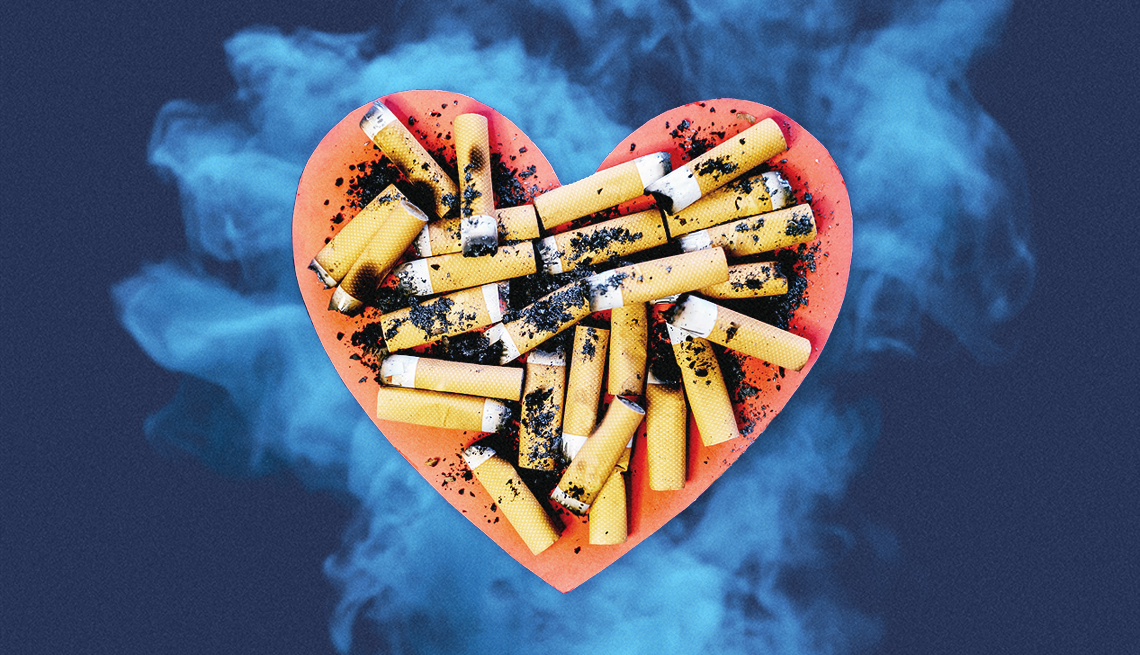AARP Hearing Center


High Blood Pressure Guide
- Symptoms, causes and tests
- Stages and types
- Treatment and prevention
- High blood pressure myths
- Alcohol and blood pressure
- Hypertension headache myths
- Smoking and high blood pressure
- Anxiety, stress and hypertension
- Is hypertension genetic?
- Medications that raise blood pressure
- Home blood pressure monitoring
- Surprising causes of hypertension
Need one more reason to quit smoking? Consider the blood coursing through the veins and arteries that carry it from your heart throughout your body. Our intricate cardiovascular system is responsible for ensuring adequate blood flow to keep us alive and functioning.
But lifestyle can stress that system — as with lighting up. Every time a person smokes, it has an immediate impact on the cardiovascular system, including blood pressure.
“Studies have shown that smoking one cigarette raises a person’s heart rate and blood pressure for about 15 to 30 minutes,” says Robert Kloner, M.D., professor of medicine (clinical scholar) at the Keck School of Medicine of USC and chief science officer at Huntington Medical Research Institutes in Pasadena, California. “So if you smoke frequently, that’s going to occur more commonly throughout the day.”
Smoking can also lead to physiological changes like stiffening of the arteries and also to atherosclerosis, which can lead to high blood pressure, which is a risk factor for heart attacks and strokes, Kloner says.
“There’s no question smoking is very bad for the cardiovascular system,” he emphasizes, “and the best advice is not to smoke.” That can be helpful for those who don’t smoke but are around it as well. Secondhand smoke can have a negative effect on cardiovascular health, just as active smoking does, and research suggests it’s associated with an increased risk of high blood pressure as well.
How much does smoking raise blood pressure?
It can be difficult to put a single number on the rise in blood pressure, because it’s so variable. But one early study published in the Journal of Hypertension found that smoking two cigarettes per hour could raise daytime blood pressure by 5 to 6 millimeters; and experts stress that even a relatively small rise can have a significant effect.
The threshold for being diagnosed with hypertension is now 130 over 80. That’s based on a 2017 American College of Cardiology/American Heart Association threshold, which was adjusted down from 140/90 mmHg. The first number in a blood pressure reading — systolic blood pressure — represents the pressure in the arteries when the heart contracts and pumps blood out to your body through the arteries. The second number — diastolic blood pressure — measures the pressure in the arteries as the heart is relaxing between beats and blood is returning to the heart through the veins.
If we wait until blood pressure is 140/90 versus a normal blood pressure of 120/80, “we’ve already doubled the risk for heart attacks and strokes,” says Keith Ferdinand, M.D., chair in preventive cardiology at Tulane University School of Medicine and a member of the committee that oversees the American Heart Association’s national hypertension control initiative. Even at that lower threshold, many people whose blood pressure rises when they smoke escape notice — but they aren’t out of harm’s way.
































































More From AARP
9 Best (and 8 Worst) Foods for High Blood Pressure
Help control your blood pressure numbers by watching what’s on your plate6 Ways to Lower Your Blood Pressure Without Medication
Try these tactics to help fight hypertension and bring your numbers down
8 Major Health Risks for People 50 and Older
A look at the top killers — and how to dodge them
Recommended for You